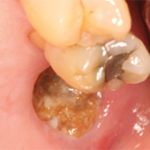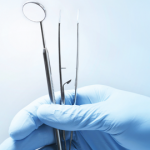“This is something that should be a normal part of an exam,” says Ms. Berg. “Looking at the oral cavity and teaching education on oral health is such an easy thing to do, but it can make a big impact, no matter what you’re studying … and no matter your specialty.”
Physician Assistant Studies is a master’s level degree that takes about two years to complete, explains Ms. Berg. During the second part of the program, PA students rotate through training stints in surgery, emergency medicine, primary care, pediatrics, psychiatry, obstetrics and gynecology, and some specialties, such as rheumatology and cardiology.
Once she graduates, Ms. Berg wants to work as a PA in emergency medicine. Part of her training thus far has included shifts in cardiology. She recalled one particular week in a cardiology unit that reinforced what she had learned about how oral health affects the whole body.
“I had multiple patients, I think two or three in a row, who had a tooth abscess that they didn’t take care of,” says Ms. Berg. “They didn’t think it was pressing.”
Many questions on possible links between rheumatic disease & periodontal disease require further study in human clinical trials, but researchers tend to agree that oral health is important for all patients living with RA.
Those patients ended up with endocarditis, a condition that can happen when germs from your mouth or other parts of the body enter the bloodstream and attach to damaged parts of the heart. The condition can damage heart valves and lead to life-threatening complications.
“They ended up with endocarditis and having to get open-heart surgery to fix their valves because they didn’t take care of their tooth abscess,” explains Ms. Berg.
Ms. Berg recalls sitting with one patient for 45 minutes “just talking about it.” She emphasizes the impact this patient had on her view of prevention in medicine, especially when it comes to oral care.
These examples may be exceptional, she says, “But it’s such an easy preventive thing that—if it were just made to be normal and not just extra things that dentists do—I think it would really make a difference.”
Aside from her full-time teaching duties at the University of Texas, Ms. Slusher continues to work once a week as a PA in rheumatology because she enjoys helping patients with chronic conditions, teaching them about the disease process and what to expect from medications. She says in her job as a professor that she emphasizes to her PA students that they should always include an oral exam while evaluating a patient.



